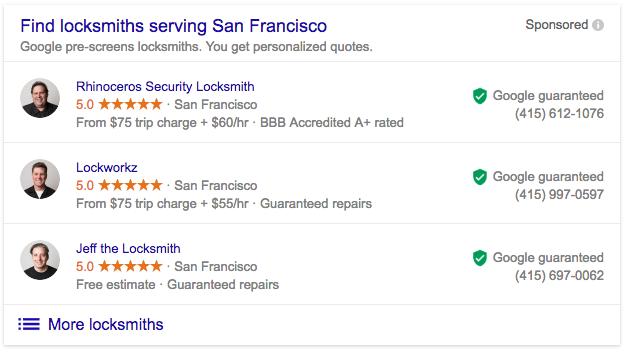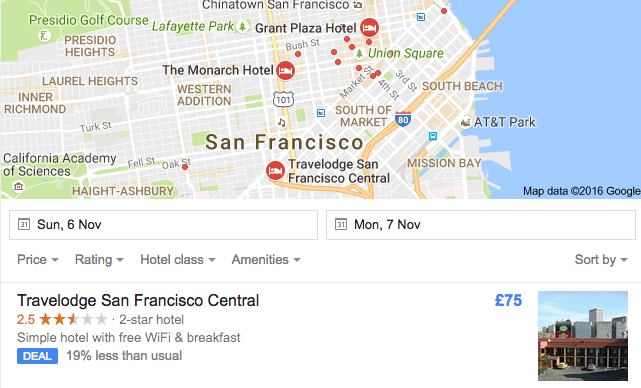What could Google Home Service Ads mean for SEO?
Last June at SMX, Google announced that the future ‘3 Pack’ would be made up of two organic listings and one sponsored listing, however, Google has recently been testing its new, ad express powered, product in the San Francisco Bay area and it looks like that all of the ‘3 Pack’ are in fact sponsored listings.
This was first spotted being tested back in 2015 when it was in beta, but I think it’s important to revisit it now that some time has passed and the possibility of this being rolled out is looking increasingly more likely, especially as it appears like it already has been in San Francisco. It is a huge deal as it means you will have to pay a fee, just to be in for a chance of being displayed in this new now card at the top of the Google search engine results page.
You can check out exactly what this looks like yourself by doing a search for Locksmith in San Francisco in Google.com and you’ll be greeted with the new now card:

At first glance it looks like Google My Business listings, but upon further inspection you see that all the results are actually sponsored, and all have 5-star reviews. The same top three paid results were always displayed for me when I checked, but according to the forum post I linked to earlier, these will be rotated based upon their reviews.
How does it work?
Our understanding is that this will be much like Google My Business, setting up Home Service Advert (HSA) Google requires you to supply it with details about yourself and your business.
What makes HSA different however, is that Google also carries out detailed background checks about you and/or your business, taking into account your qualifications, certifications, years of service and we presume the search engine may also require references from previous customers.
These strenuous checks mean that Google feels comfortable enough to add its own ‘Google guaranteed’ verification to the listings it displays.
One does wonder about the scalability of Home Service Adverts though, especially when rolled out globally, Google would seemingly need to hire thousands of customer service representatives to process the sheer amount of applications they company will be receiving.
At present, it appears that Google Home Service Adverts are being used in the San Francisco Bay Area only, before being rolled out to other areas.
What this means for SEO
If it turns out that Google continues this monetised approach it will soon be a very real possibility that Google My Business will fade away and be replaced by something very similar to the HSA monetised model, which we understand will be very dependent on service user reviews.
This would mean that an SEOs ability to affect the performance of a Google My Business listing, as well as affecting whether or not a website appears in the local stack is lost. All they can do for their clients is get them to submit accurate details and encourage service users to leave a review.
This isn’t the first time we’ve seen Google step into markets outside of search results. For a while now Google has been displaying hotel prices in now cards (from partners who use the Hotel Prices Application API) for a number of years:

The Home Service Adverts also remove the emphasis on a local serviceman to need a strong organic search presence. It’s commonplace for larger businesses with bigger budgets to command a lot of page-one real estate, but HSA levels the playing field allowing smaller independent servicemen the opportunity to appear at the top of page one.
That being said, I don’t think that this necessarily means that smaller sole traders and businesses can ditch their websites altogether. They will still require a strong organic presence should a user scroll past the HSA now card.
We’ve conducted a few searches for servicemen in San Francisco and it appears that this hasn’t hit all industries (as of yet), and it’s unclear how many industries will be included.
Conclusion
It seems like Google’s ultimate goal is to eventually have all search results to sit in a customised environment designed to maximise impact, such as the HSA and HPA now cards, and even in non-commercial areas with things such as Google Answer Boxes and the ever evolving structured data mark up – both of which are used to help Google answer your query even faster.
Along with the introduction of AMP, you could say that Google is trying to introduce ‘zero click’ search, where rather than working hard on algorithms to deliver results that ‘highly meet’ a user’s search query in the first 10 positions, the engine is trying to remove that one click to the correct result altogether, instead serving the information and calls to action within the SERP.